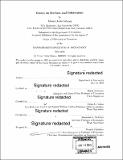Essays on markets and information
Author(s)
Gitmez, Ahmet Arda.
Download1120769389-MIT.pdf (12.07Mb)
Other Contributors
Massachusetts Institute of Technology. Department of Economics.
Advisor
Daron Acemoglu, Parag A. Pathak, and Alexander G. Wolitzky.
Terms of use
Metadata
Show full item recordAbstract
This thesis contains three chapters on the interplay between markets and information. In the first chapter, I study how market opportunities influence the information revealed in longterm relationships. To this end, I build a model of employment relationships where the worker has private information about match quality, the firm learns about match quality over time, and the firm makes a match-specific investment. Improved market opportunities for workers promote productive relationships because they let the worker signal her firm-specific productivity by forgoing market opportunities. Signaling allows the firm to bypass the learning stage and encourages investment (signaling effect). Improved market opportunities for firms, however, discourage longterm relationships and undermine investment incentives (layoffs effect). I embed the relationship game in a search market equilibrium where market opportunities for both parties depend on search frictions and market thickness. With intermediate values of market thickness, relationship productivity and worker welfare are u-shaped in search frictions: when search frictions decrease from high to intermediate levels, the layoffs effect dominates; when search frictions are sufficiently low, the signaling effect dominates. In the second chapter, joint with Umut Dur, Parag Pathak and Tayfun Sdnmez, I study the effects of enlarging the message space to allow for further information revelation in centralized markets. School districts with choice plans struggle to expand access to schools across neighborhoods while keeping busing costs down. Existing assignment mechanisms allow students to rank a school, but do not elicit preferences about transportation. Typically, if a student is assigned far from home, the district provides transportation. We propose enlarging the message space in the mechanism by allowing students to apply to a school both with and without transportation. Under our proposal, a non-neighborhood applicant who is willing to forgo transportation services obtains a greater chance of being assigned to a school. In decentralized admissions systems, we show that this option reduces transportation but not access for non-neighborhood applicants. We then generalize these results to a centralized assignment mechanism under special conditions. Expanding the message space provides a new tool for distributional objectives that operates in a different fashion than more traditional levers like changing priorities or choice sets. In the third chapter, joint with Pooya Molavi, I study an information design problem. We present a model of media capture, a politician having control over the editorial policies of media. At the heart of the model is the trade-off faced by a politician who wants to persuade the citizens: she wants to capture the media and produce news in her favor, but capture leads the citizens to not follow the media as they find them uninformative. The model is a Bayesian persuasion model (a la Kamenica and Gentzkow (2011)) with an audience of heterogeneous priors. We identify conditions on the distribution of priors that guarantee full information revelation and no information revelation by the captured media. The model also has several testable predictions: (i) the information content of the news provided by the captured media decreases as the politician becomes more popular, (ii) in societies with more extremists than moderates, the media are more likely to produce "negative" news than "positive" ones, and (iii) in societies where the media are less accessible to citizens, they are more informative.
Description
Thesis: Ph. D., Massachusetts Institute of Technology, Department of Economics, 2019 Cataloged from PDF version of thesis. Includes bibliographical references (pages 147-154).
Date issued
2019Department
Massachusetts Institute of Technology. Department of EconomicsPublisher
Massachusetts Institute of Technology
Keywords
Economics.